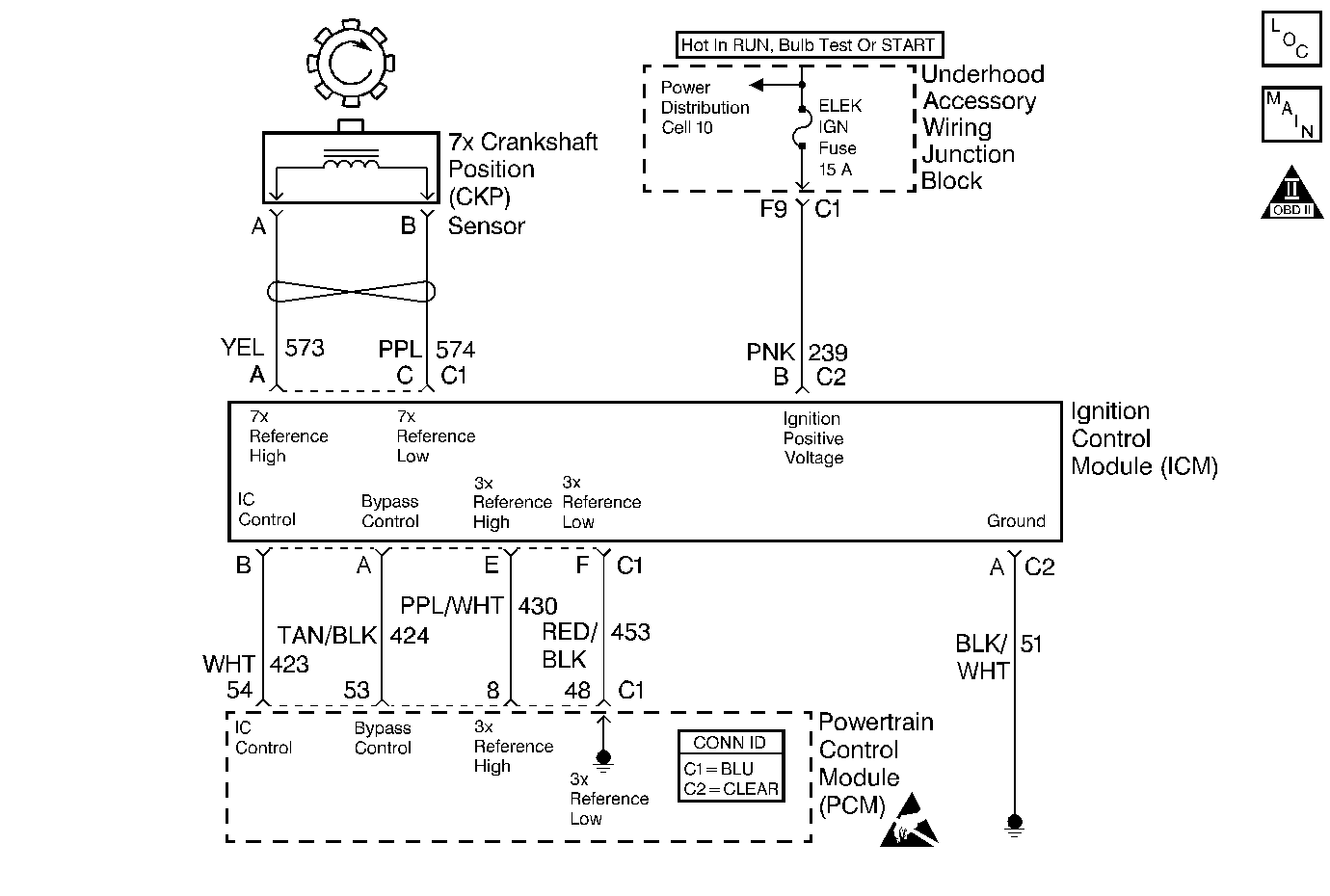
Circuit Description
The Ignition Control (IC) Module sends signals that the PCM requires for fuel control and spark advance calculations. At the start of engine crank, the IC Module controls spark advance (Bypass mode.) When the second 3X reference pulse is recognized by the PCM, the PCM applies 5 volts to the Bypass circuit, commanding the IC Module to switch spark advance to PCM control (IC mode). If the PCM detects an open in the IC circuit, DTC P1351 will set. The engine will start and may run in Bypass mode timing.
Conditions for Running the DTC
The engine is running.
Conditions for Setting the DTC
| • | The PCM detects an open in the IC circuit. |
| • | The condition is present for 300 3X reference periods (100 crankshaft revolutions). |
Action Taken When the DTC Sets
| • | The PCM illuminates the malfunction indicator lamp (MIL) on the second consecutive ignition cycle that the diagnostic runs and fails. |
| • | The PCM records the operating conditions at the time the diagnostic fails. The first time the diagnostic fails, the PCM stores this information in the Failure Records. If the diagnostic reports a failure on the second consecutive ignition cycle, the PCM records the operating conditions at the time of the failure. |
| • | The PCM writes the conditions to the Freeze Frame and updates the Failure Records. |
Conditions for Clearing the MIL/DTC
| • | The PCM will turn OFF the malfunction indicator lamp (MIL) during the third consecutive trip in which the diagnostic has run and passed. |
| • | The history DTC will clear after 40 consecutive warm-up cycles have occurred without a malfunction. |
| • | The DTC can be cleared by using a scan tool. |
Diagnostic Aids
Check for the following conditions:
Important: : Remove any debris from the connector surfaces before servicing a component. Inspect the connector gaskets when diagnosing or replacing a component. Ensure that the gaskets are installed correctly. The gaskets prevent contaminate intrusion.
| • | Poor terminal connection. |
| Inspect the harness connectors for backed out terminals, improper mating, broken locks, improperly formed or damaged terminals, and faulty terminal to wire connection. Use a corresponding mating terminal to test for proper tension. Refer to Intermittents and Poor Connections Diagnosis , and Connector Repairs Wiring Systems. |
| • | Damaged harness. |
| Inspect the wiring harness for damage. If the harness appears to be OK, observe the sensor display on the scan tool while moving connectors and wiring harnesses related to the sensor. A change in the sensor display may indicate the location of the fault. Refer to Wiring Repairs in Wiring Systems. |
| • | Inspect the PCM and the engine grounds for clean and secure connections. |
If the DTC is determined to be intermittent, reviewing the Fail Records can be useful in determining when the DTC was last set.
Step | Action | Value(s) | Yes | No |
|---|---|---|---|---|
1 | Was the Powertrain OBD System Check performed? | -- | ||
2 |
Does the J 39200 DMM display a resistance below the specified value? | 500ohms | ||
3 |
Was a problem found? | -- | ||
4 |
Was a problem found? | -- | ||
5 |
Was a problem found? | -- | ||
6 | Replace the Ignition Control Module. Refer to Ignition Control Module Replacement . Is the action complete? | -- | -- | |
7 | Replace the PCM. Important: : Replacement PCM must be reprogrammed. Refer to Powertrain Control Module Replacement/Programming . Is the action complete? | -- | -- | |
8 |
Does the scan tool indicate DTC 1351 failed this ignition? | -- | System OK |
